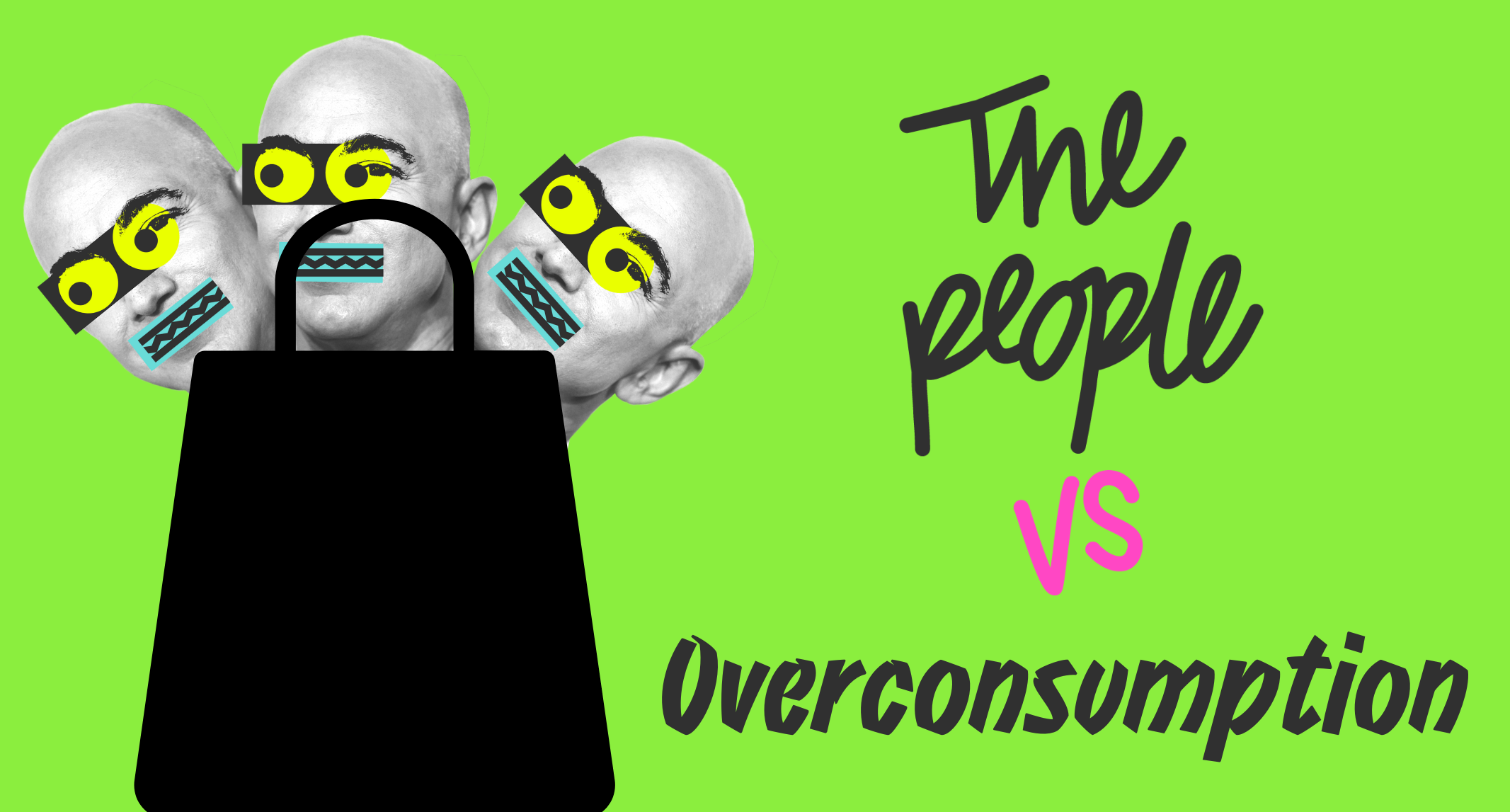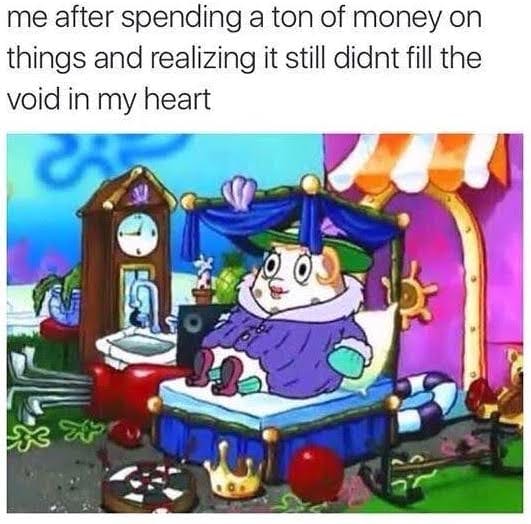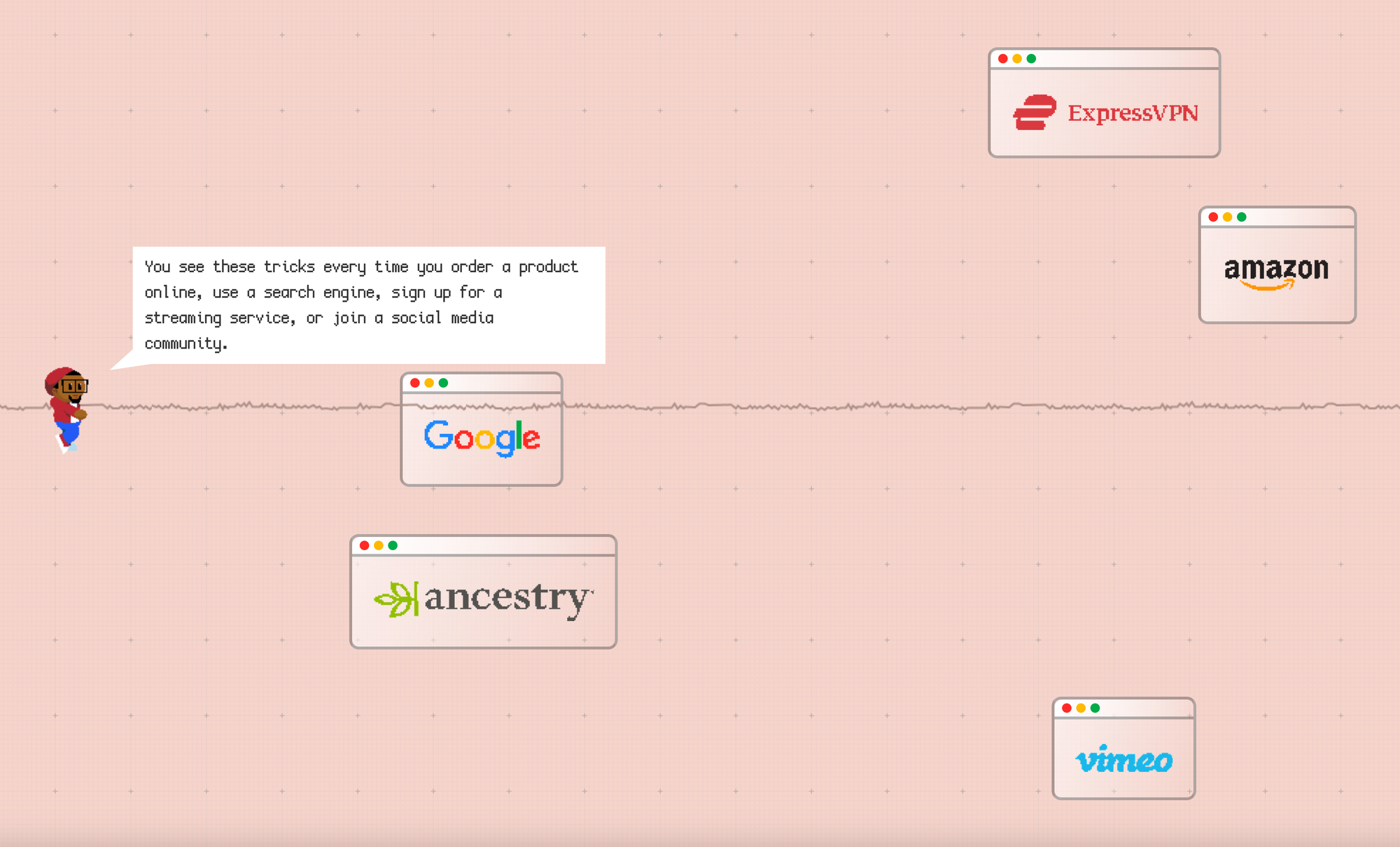The People vs Overconsumption
The tech giants are tricking us into destroying our pockets – and planet 😒

In New York City, spring is coming. This means I’m eager to get out of my under-sized and overpriced apartment at any chance I get. As a dog parent, that opportunity presents itself easily. But most mornings when my pup and I exit the elevator, we have to make our way past a mountain of packages in the lobby. Most are from tech giant Amazon – the arrow bent into a pseudo-smiley face, a sinister grin looking up at me...
I’m not judging. Some days, these packages have my name on them. But seeing the physicality of my entire building’s consumer habits frequently gives me pause. We are buying a lot, and often. Given the planetary impact alone, we ought to reel it in.
Yet, our devices increasingly anticipate our wants before we even articulate them. Between the constant marketing emails, surveillance advertising, and push-notifications, we’re living in a digital ecosystem monopolised by Big Tech. And that raises a critical question: Are we consuming by choice – or by design?
I’m Liana DeMasi, a journalist, writing professor, and the author of the 19th issue of The People, a bi-weekly newsletter from People vs Big Tech and the Citizens. This week, I’m looking at the monster-grip Big Tech has on us, our wallets, and our planet.
Big Tech Oligarchs control our internet – and in turn much of our lives – making their billions from buying and selling our data, and pushing us to overconsume.
Global e-commerce sales are expected to surpass $6.8 trillion in 2025. The environmental impact of online shopping is colossal. According to forest conservation group Canopy, 3.1 billion trees are logged annually in order to keep up with the need for boxes and shipping containers. A staggering 44% of plastics are made for shipping purposes. In 2021, Amazon alone (which basically has an e-commerce monopoly in many parts of the world) generated 709 million pounds of plastic packaging waste.
@levi_hildebrand Cancelling my Amazon Prime account was my first step in my mission to unsubscribe from everything and take back control of my money and attention. ✊🏻 Amazon was an easy one for me because I didn’t really use it all that often, but that’s actually all the more reason to get rid of it. I started thinking about all the ways in which a “non-Amazon” shopping experience would be better and once you get cost and convenience out of the way there’s really no comparison. Don’t get me wrong, I understand that having things delivered to your house is nice and sometimes there’s cheap stuff on there you can’t get anywhere else but I think we’ve come to rely on it way too much. The deals really aren’t that great if we’re being honest, you’re probably impulse shopping on there more of the time anyways, and you’re missing another opportunity to build connections in your community… with Dave. Haha • • • • • • #amazon #onlineshopping #amazonmusthave
♬ original sound - levi_hildebrand
Whether you visit their website to buy that last minute fancy outfit, use Audible to buy audiobooks, or shout to Alexa when you need to order more toilet paper, Amazon makes it easy to buy anything you need at a moment’s notice. And with many of us overworked and underpaid, the ease and convenience of e-commerce is enticing. But that ease is far from some kind of omniscient caregiver…
Buy now, pay later! 🤑
Take buy-now-pay-later (BNPL) schemes. Affirm, Klarna, Amazon Pay Later, and Axio (which Amazon just acquired) are examples of BNPL. Need or want something, don’t have the funds to pay for it all right now, and don’t want to worry about credit card interest or checks? By-now-pay-later is your friend!

Or is it? Enticed to spend money you don’t have, and perhaps not noticing hidden fees tacked onto late payments, by-now-pay-later makes it easier for us to keep buying things – and much easier to rack up debt. And it inevitably impacts the most vulnerable in society, such as women, home-renters, and economically disadvantaged groups.
Axio brags it can help make credit decisions “within two clicks and five seconds.” But I don’t know if this is something to brag about. Isn’t this swiftness kind of terrifying, considering the impact credit scores have on our financial present and future?
Then there’s more murky territory: what are companies like Amazon doing with our credit scores and histories? We don’t have all the answers here, but Margarida Silva, a researcher who focuses on the power of Big Tech at the Netherlands-based Centre for Research on Multinational Corporations (SOMO) shared her thoughts with me:
“With surveillance advertising, we see vulnerability traits being targeted. A company like Amazon has all your information. Are they using this data in their financial services? Are you going to be shown products that are more expensive or cheaper depending on your credit score? These are questions the companies should be answering and aren’t.”
Vulnerability traits are anything from your search history to your purchasing habits, your religion to your sexuality. These data points (stored in high-polluting data centres) are used to send you targeted marketing via surveillance advertising.
Just last week, Tanya O’Carroll (who happens to be People vs Big Tech’s co-founder 😉) won a landmark case against Meta in the UK, forcing the company to stop targeting adverts at her using her personal data. Tanya got inspired to take action after she got pregnant and creeped out about all the motherhood ads she was being served – before she’d even told people in her private life the news.
This case has the potential to kick Big Tech where it hurts. Around 99% of Meta’s revenue and 77% of Google’s revenue comes from surveillance advertising.

Margarida told me that not so long ago, experts and citizens alike said that Big Tech wasn’t literally listening to us, but that they had such a good collection of data on us that they could (super accurately) predict our interests anyway.
Fast forward to 2025. Apple is set to pay $95 million after a lawsuit that found Siri was listening to customers. Similar lawsuits were filed against Google in 2021 and Amazon in 2019 over their voice assistants. Is it a stretch to presume they could be doing the same with our credit scores via buy-now-pay-later schemes, ensuring that we consume, consume, CONSUME?
Dark patterns 😈
Ever thought you unsubscribed from a company’s mailing list but found that same business’ marketing in your inbox the following week? Or perhaps you’ve bought what you thought was a single item on Amazon, only to find a recurring monthly charge for a “subscription” on your bank statement?
This is what tech experts call ‘dark patterns,’ and the chances are, you’re no stranger to them. A European Commission report on dark patterns found 97% of the most popular websites and apps used by EU consumers deployed at least one dark pattern.
Human rights technologist and artist Caroline Sinders told me harmful design patterns are elements that “manipulate, confuse, or add friction to users' decision processes.” These patterns can manifest in various forms, from cookie banners to subscription services.
Caroline created this amazing interactive site to help visualise her research and personal experience with harmful design patterns:

In an effort to unsubscribe from several e-commerce sites and companies, Caroline timed and tracked how much time and money was lost in the process. “I lost $330.60 in 57 minutes and 31 seconds trying to unsubscribe,” she writes in the piece.
“Harmful design patterns can lead to unintentional overconsumption. You don't realize what you're still subscribed to or paying for unless you're really, really monitoring it,” she told me, adding that these same tactics often make it difficult for users to choose options which protect their privacy, too.
The European Commission report found that knowledge of this kind of design of our user experience made people less susceptible to dark patterns. But Caroline stressed that everyone, including experts like her, can fall victim to these patterns, particularly when dealing with time constraints or using mobile devices.
Progress has been made to protect consumers from these practices in places like the UK, EU, and the US. The EU Digital Services Act prohibits the use of dark patterns, for example, from making it difficult to refuse tracking or data collection, to fake urgency tactics – like claiming “Only 1 left at this price!” when untrue.
But we have a long way to go. From surveillance advertising to harmful and addictive design patterns, Big Tech has us stuck in a cycle of overconsumption. And with a loss of money, time, data, and privacy – not to mention our beautiful planet – it’s clear that Big Tech is overconsuming us.
Actions you can take ✊
👾 Ask Meta to stop showing you surveillance ads. If you’re in Europe, you can send an email to Meta objecting to unwanted direct marketing and data misuse. It’s your right – and People vs Big Tech member Ekō have created a nifty tool to help you exercise it!
👾 Use privacy-focused browsers like DuckDuckGo or Firefox. For extra points, start using a virtual private network (VPN) to encrypt your internet behaviors, hiding your data from Big Tech.
👾 Keep up to date with the laws. Big Tech’s dirty tricks you’re falling victim to might actually be against your government’s data, consumer and privacy laws (e.g. the EU Digital Services Act or California’s Consumer Privacy Act)
👾 Support the Free Our Feeds campaign – a movement working to prevent any single billionaire from controlling all our social media platforms.

